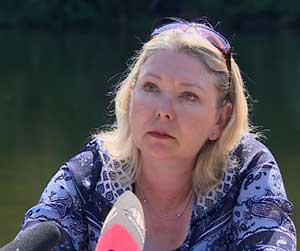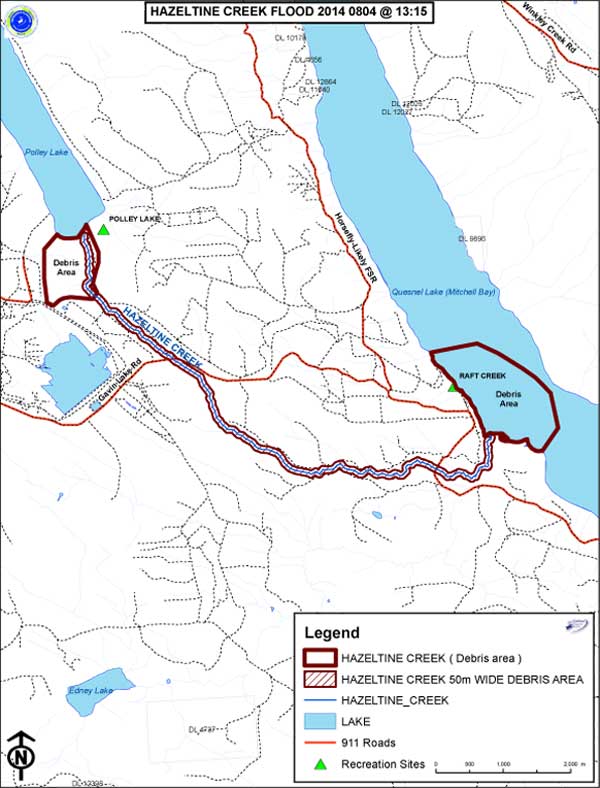
A water ban has been lifted for the community of Likely and part of the Quesnel River, following a massive tailings pond spill from the Mount Polley mine in B.C.'s Cariboo region on Monday.
The ban remains in effect for Polley Lake, Hazeltine Creek, Cariboo Creek, Quesnel Lake, and the south part of Quesnel River, while more water samples are collected.
"The results are encouraging," said Dr. Trevor Corneil of the Interior Health Authority at a press conference on Friday. "We are pleased to be able to open things up from that point on the Quesnel River and around Likely."
Minister of Environment Mary Polak said samples have been analyzed from five sites along the Quesnel River, including the areas most affected by the spill.
Ministry officials have also taken four samples from Polley Lake, but have not yet received results.
Al Richmond, the Cariboo Regional District chair, is optimistic about the quality of water throughout the spill area.
"We look forward to more promising announcements as the week progresses," he said at the conference.
'It's early days yet'
Jeff Curtis, an expert on water quality at the University of British Columbia, agrees that the results so far are encouraging.
But he said there are still unanswered questions.
"I would say it's early days yet," he said. "We can't predict everything because these spills are rare. I wouldn't be surprised at all if this was uncharted territory."
Curtis said the big unknown is whether the 4.5 million cubic metres of sediment that spilled from the tailings pond will pose a long-term threat to the environment.
According to Polak, officials have started to collect sediment and fish samples to find out whether the silt is toxic.
"The most significant amount of the sediment seems to have landed in the Hazeltine Creek valley and Polley Lake," she said. "In Quesnel Lake, we are not seeing broad distribution sediment."
But Curtis said finding out where the sediment landed is just the first step in a long process.
Next, experts will need to figure out whether toxins in the tailings, like arsenic and mercury, are "bioavailable" -- that is, whether they are in a form that could leach into the water or be consumed by animals.
If they are, they won't necessarily show up in fish right away.
Curtis said the first organisms to be affected would be insects and worms that live on the lake floor and eat sediment directly. The toxins could then travel up the food chain.
No easy cleanup for sediment
According to Curtis, the threats to human health are much lower than the risk to the ecosystem. He said water from the tailings pond prior to the spill was probably better than some Canadian drinking water, based on water quality results released by Imperial Metals for the last five years.
"We tend to make it all about us," he said. "But our exposure to water is quite low. The greatest likelihood is that aquatic organisms will be the most exposed. They'll feel the brunt of this."
If the sediment turns out to be dangerous, Curtis said there are no easy cleanup options.
The silt could be buried under a layer of uncontaminated sediment, or it could be dredged up and removed. Both methods are very expensive, and neither is failsafe.
Tailings could be swept into Quesnel Lake
But some of the tailings from the Mount Polley spill could soon be inadvertently washed into Quesnel Lake, according to a critic.
Currently, sediment is lining the Hazeltine Creek valley, which was carved into a wider channel when millions of cubic metres of water flooded through it on Monday.
The Ministry of Environment is now planning to pump excess water from Polley Lake through the valley into Quesnel Lake, to stop Polley Lake from overflowing its banks.
At the conference, Polak said the water will not be pumped "until there is testing that shows that water is of drinking water quality."
But Ramsey Hart of MiningWatch Canada said the ministry is ignoring the tailings sitting in the creek valley.
"Is the streambed safe?" he asked. "Are you not going to mobilise more solids down to the lake? You're kind of just going to make it worse."
Hart said the potential for leaching of the various metals in the sediment needs to be tested immediately.

Read more: Environment














Tyee Commenting Guidelines
Comments that violate guidelines risk being deleted, and violations may result in a temporary or permanent user ban. Maintain the spirit of good conversation to stay in the discussion.
*Please note The Tyee is not a forum for spreading misinformation about COVID-19, denying its existence or minimizing its risk to public health.
Do:
Do not: